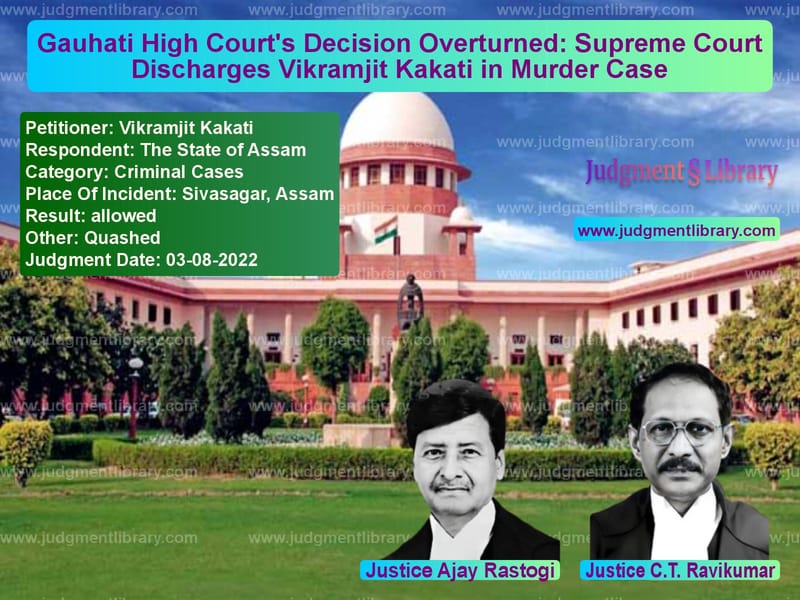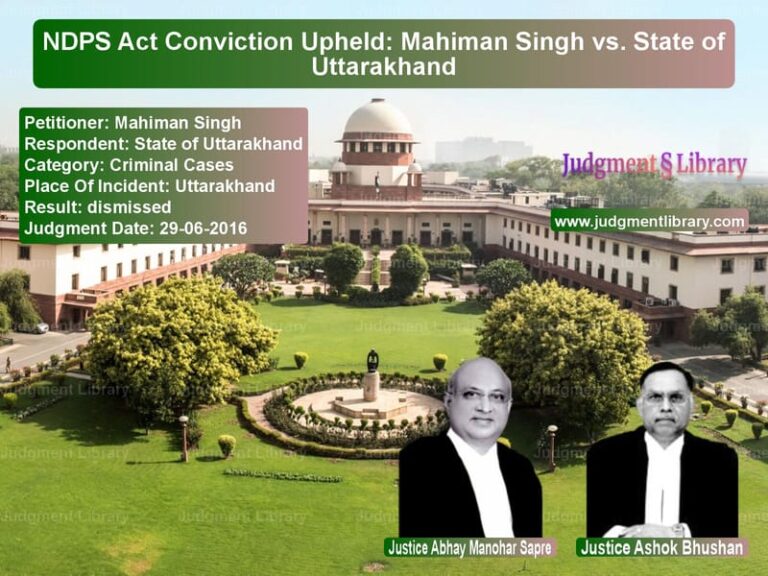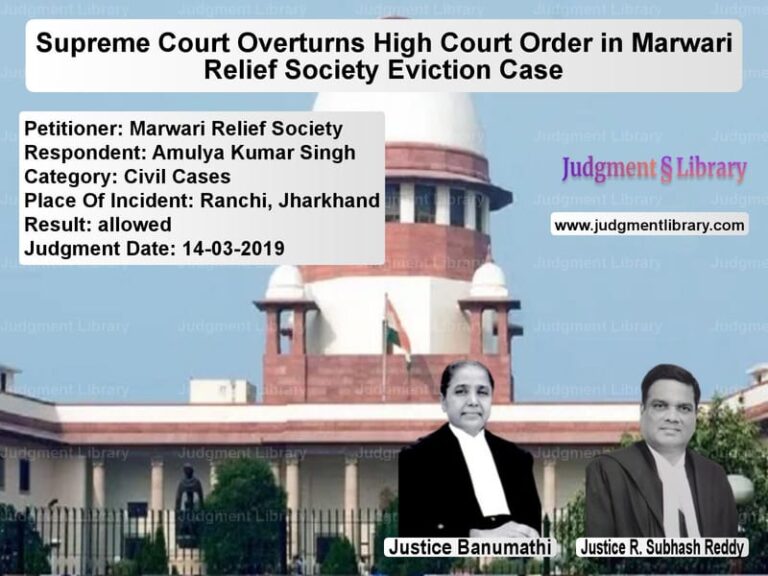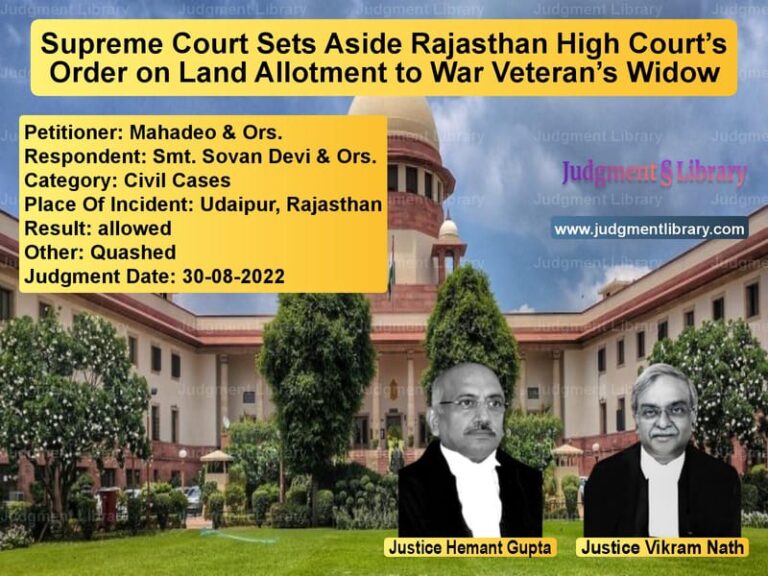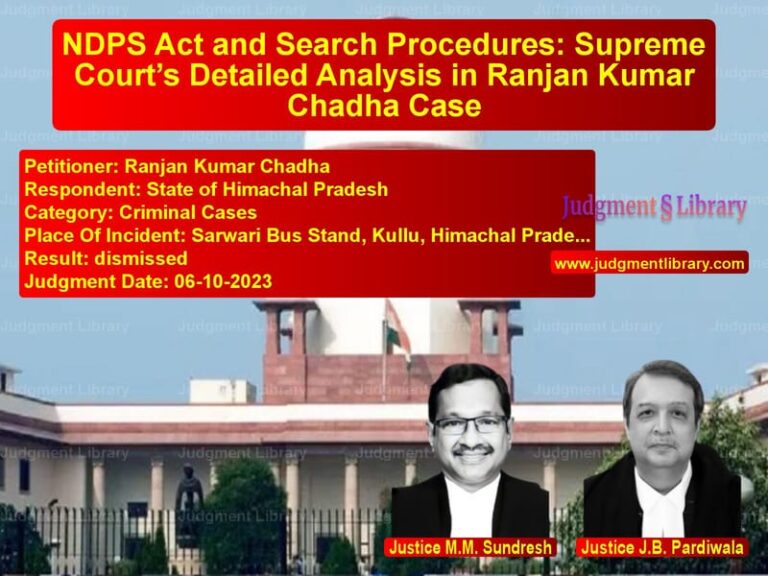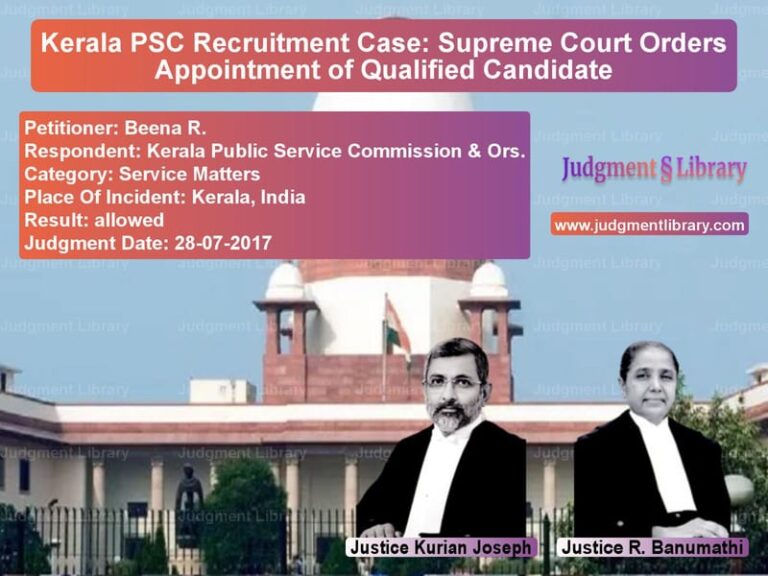Gauhati High Court’s Decision Overturned: Supreme Court Discharges Vikramjit Kakati in Murder Case
The case of Vikramjit Kakati vs. The State of Assam involves a murder charge under Section 302 of the Indian Penal Code (IPC) against the appellant, which was ultimately quashed by the Supreme Court. The appellant was accused of conspiring in the murder of his colleague, but the Court found no substantive evidence linking him to the crime. The ruling not only discharged the appellant but also set crucial legal precedents regarding wrongful framing of charges and the burden of proof.
Background of the Case
The case began with the filing of an FIR on April 28, 2009, by Smt. Rajia Islam, the mother of the deceased, at the Sivasagar Police Station. The complaint alleged that her son, Lt. Qureshi Sahidul Islam, was burned to death inside his rented house in Sivasagar under suspicious circumstances. The FIR named his wife, Smt. Zahida Imdad Islam, the mother-in-law, Smt. Jahanara Islam, and the appellant, Vikramjit Kakati, as suspects. The complaint alleged that they had conspired to murder the victim and remove evidence of the crime.
The police subsequently registered Case No. 198/2009 under Sections 302, 120-B, 201, and 118 IPC. The charge sheet was filed, listing 13 witnesses.
Legal Issues Before the Court
The Supreme Court was required to address the following legal questions:
- Whether there was any prima facie evidence to frame charges against the appellant under Sections 302, 120-B, and 201 IPC.
- Whether the trial court and High Court erred in rejecting the appellant’s discharge application.
- Whether mere suspicion is enough to proceed with framing charges in a criminal case.
Arguments Presented
Petitioner’s (Appellant’s) Arguments
- The appellant argued that he was merely a friend and colleague of the deceased and had no involvement in the alleged crime.
- He stated that on the morning of April 22, 2009, he received a phone call from the victim’s wife, informing him about the burn injuries sustained by the deceased.
- He rushed to the deceased’s house with another colleague, Tariqul Rafique, and transported the victim to a local hospital in his car.
- The appellant contended that he had only tried to assist the victim in receiving medical treatment and had no connection to the alleged conspiracy or destruction of evidence.
- He pointed out that none of the witnesses named in the charge sheet had made statements implicating him in the crime.
Respondent’s (State of Assam’s) Arguments
- The prosecution argued that the appellant had conspired with the co-accused and played a role in destroying evidence related to the murder.
- They contended that at the charge-framing stage, the court was only required to establish whether there was a prima facie case against the appellant.
- The prosecution insisted that the trial court had rightly rejected the discharge application, and the High Court had correctly upheld this decision.
Supreme Court’s Observations
On the Absence of Prima Facie Evidence
The Supreme Court, comprising Justice Ajay Rastogi and Justice C.T. Ravikumar, emphasized that criminal trials must not proceed merely on the basis of suspicion. The Court ruled:
“The investigating officer has not brought even prima facie material in the charge-sheet as to what was the motive on the part of the appellant to commit the alleged offence.”
The Court further noted that the appellant’s only involvement in the incident was transporting the deceased to the hospital and informing his relatives.
On the Role of the Trial Judge
The Court criticized the approach taken by the trial judge in framing charges, stating:
“The trial Judge is not a mere post office to frame the charge at the instance of the prosecution. The Judge has to sift the evidence to determine whether there is sufficient ground to proceed.”
On the Statements of Witnesses
The Court observed that the only eyewitness to the incident, a domestic worker named Hosna Begum, did not implicate the appellant in her statements under Sections 161 and 164 Cr.P.C. Instead, she confirmed that the appellant had assisted in taking the deceased to the hospital.
On Conspiracy and Destruction of Evidence
The Court ruled that the prosecution had failed to produce any material evidence to show that the appellant had engaged in a criminal conspiracy or tampered with evidence.
“For the charge of conspiracy, there must be some material showing prior meeting of minds to execute the alleged offence. No such evidence has been produced.”
Judgment and Its Implications
The Supreme Court allowed the appeal and set aside the orders of the High Court and trial court. The key directives of the judgment were:
- The appellant, Vikramjit Kakati, was discharged from all charges.
- The trial against the remaining accused could continue independently.
- The judgment clarified that courts must apply due diligence before framing charges in criminal cases.
Significance of the Judgment
- Prevents Misuse of Criminal Law: The ruling reinforces that suspicion alone is insufficient to initiate criminal proceedings.
- Sets a Higher Bar for Conspiracy Charges: The judgment establishes that courts must demand concrete evidence before allowing conspiracy charges to proceed.
- Protects Innocent Individuals from Unjust Trials: The decision ensures that individuals are not dragged into criminal trials based on baseless allegations.
Conclusion
The Supreme Court’s ruling in Vikramjit Kakati vs. The State of Assam is a landmark judgment that upholds the principle that criminal charges must be backed by substantial evidence. By discharging the appellant, the Court has reinforced the importance of fair trial procedures and protection against wrongful prosecution. This ruling will serve as a significant precedent in future criminal cases involving allegations of conspiracy and destruction of evidence.
Petitioner Name: Vikramjit Kakati.Respondent Name: The State of Assam.Judgment By: Justice Ajay Rastogi, Justice C.T. Ravikumar.Place Of Incident: Sivasagar, Assam.Judgment Date: 03-08-2022.
Don’t miss out on the full details! Download the complete judgment in PDF format below and gain valuable insights instantly!
Download Judgment: vikramjit-kakati-vs-the-state-of-assam-supreme-court-of-india-judgment-dated-03-08-2022.pdf
Directly Download Judgment: Directly download this Judgment
See all petitions in Murder Cases
See all petitions in Attempt to Murder Cases
See all petitions in Judgment by Ajay Rastogi
See all petitions in Judgment by C.T. Ravikumar
See all petitions in allowed
See all petitions in Quashed
See all petitions in supreme court of India judgments August 2022
See all petitions in 2022 judgments
See all posts in Criminal Cases Category
See all allowed petitions in Criminal Cases Category
See all Dismissed petitions in Criminal Cases Category
See all partially allowed petitions in Criminal Cases Category

